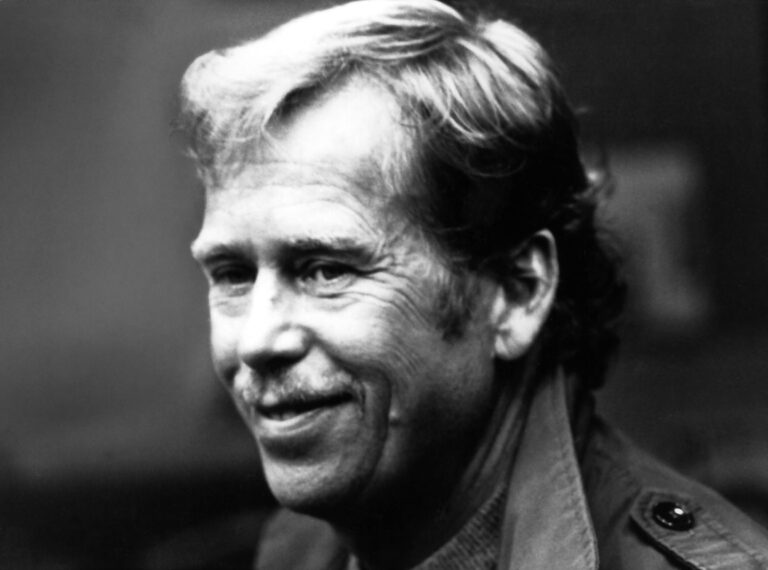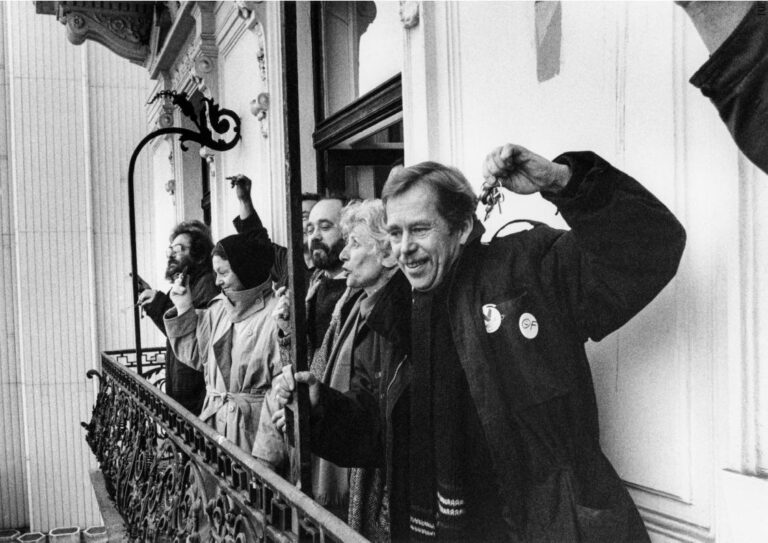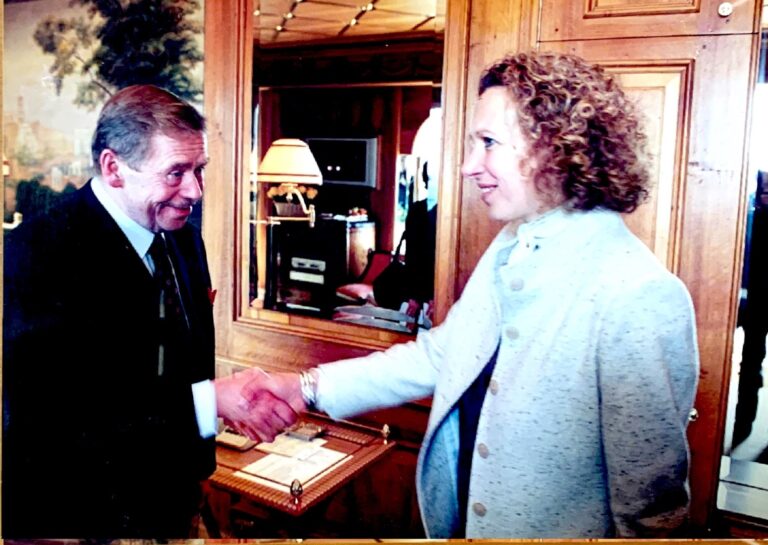Václav Havel
FIRST PRESIDENT OF THE CZECH REPUBLIC, PLAYWRITER AND ESSAYER
Who is Havel?
Václav Havel
His political thought was and is based on anti-populism, tolerance, freedom, and responsibility. On the other hand, Havel appreciated politics as a discourse in society, but not as arbitrariness aimed at crushing the citizen. In his formulation of "non-political politics," there is no trace of modern populism. As a sincere democrat, Havel was not an anti-politician; he wanted an innovative politics close to the people. In Havel's philosophy, there was no room for contempt for the public function as long as it was transparent and served the citizens. Havel tried to promote tolerance through the instrument of politics. In the modern sense of the term, politics is about being able to tolerate one's neighbor and ensure freedom of expression within the liberal democratic framework.
Freedom
Freedom, for Havel, was the blood flowing in the political body. It was to be understood as something extensive, encompassing freedom of thought, opinion, religion, and enterprise. Havel appreciated liberal democracy as a form of government consisting of rights and duties of citizens.
Finally, freedom cannot be separated from responsibility. Havel worked hard on the responsibility of human action, not only in politics but also in various social issues. Freedom must be anchored to everyone's responsibility, both in terms of the responsibility to act and to have acted.
Biographical notes
Since he was a child, he loved reading and writing, starting with poetry. However, what attracted him the most were feature films, which, given his "social roots," he would soon have to give up. When he was just twenty years old, he published some essays on literature and cinema in important cultural magazines, but it was the 1960s that pushed him to focus on theater. In 1959, he worked as a stage technician at the ABC Theater in Prague, and later in other theaters in the capital. In 1963, the staging of his play "The Garden Party," which for the first time showed a world governed by absurd laws but regulated by mathematical logic, led to talk of a "Czech variant" and "Theater of the Absurd," an artistic experience always guided by a rigorous ethical sense and intimately linked to the political events of the nation. During the Prague Spring, Havel visited the United States, where he participated in the premiere of his play "Memorandum" in New York, thus meeting Czech intellectuals in exile.
Gli anni '60
The American culture of the 1960s, with its music, human rights movements, and hippies, will be a source of future inspiration for Havel. He was caught off guard by the Soviet invasion of Czechoslovakia while in Liberec, a town in the north of the country, and immediately joined the "resistance," writing a series of manifestos and proclamations against the occupation for Czech radio. As a result, Havel was excluded from cultural and political life.
Gli anni '70
In the 1970s, Havel abandoned the principles of the THEATER OF THE ABSURD, to instead describe the social mechanisms that externally regulate the life of the individual. During this time, he also devoted himself to creating visual, almost existentialist poetry, which was later collected in the volume "ANTICODICI". He worked as a worker in a brewery and from this experience came the famous play "THE AUDIENCE".
His political engagement did not wane and during these years of "strong normalization", he sent an open letter to President Gustáv Husák, describing Czechoslovakia as a society governed by fear. In 1977, Václav Havel co-authored the first text of the CHARTER and was one of the three main spokespersons for the CHARTER 77 movement, a manifesto for human rights in Czechoslovakia. The CHARTER included hundreds of characters and activists from various intellectual currents - democrats, Christians, reformers, and the underground.
The arrest
Later, Havel was arrested and spent 4 years in prison where he continued to write and harshly analyze the totalitarian regime, while also reflecting and searching for a way to dialogue with the regime. The psychological dramas he wrote during this time about identity and civic and personal responsibility would remain the strongest themes of his works even in the years to come, placing his literary creations above space and time. For this reason, his works were more published abroad than in his homeland, where Václav Havel was considered a worthy opponent of the regime and his works were increasingly appreciated and performed in theaters around the world.
The presidency
Havel becomes the first President of Czechoslovakia and then President of the new Czech Republic from 1992 to 2003 for two terms.
Havel became the first President of Czechoslovakia and later President of the new Czech Republic from 1992 to 2003 for two terms. During his presidency, Havel was committed to promoting human rights and freedom of expression, both nationally and internationally. He worked towards peace in the Balkans and the construction of a united and democratic Europe.
Havel was known for his integrity, civic engagement, and profound human sensitivity. Due to his personality, experience, and reputation, he was considered a figure of great prestige not only nationally but also internationally.
After the end of his presidential term in 2003, Havel continued to be an active supporter of democracy and human rights until his death in 2011.
Some quotes
New Year's Address to the Nation
Enlightening and one of the most significant speeches Václav Havel ever made was the New Year's Eve speech of 1989. Arriving at the Castle in a magical atmosphere of freedom, Havel amazed everyone by delivering a speech on individual responsibility. He brought truth back to the center of political discourse, the same truth denied in the lies of the totalitarian regime. Havel denounced communist fiction and anti-politics – totalitarianism is the opposite of politics, democracy, and freedom – courageously unmasking the lies of socialism.
None of us is a victim
"We had all become accustomed to the totalitarian system and had accepted it as an unchangeable fact, thus contributing to its perpetuation. In other words, we are all [...] responsible for the functioning of the totalitarian machine. None of us is a victim." Harsh words: an unexpected wake-up call that laid the foundation for the beginning of a new life in the democratic state, but at the same time demanded accountability for the past.
"We live in the truth"
The message of Václav Havel in 1989 is a call for responsibility, and therefore for freedom. "Society" is set in motion if freedom corresponds to responsibility - the opposite of populism. Only in this way can we emerge from "post-totalitarianism" and society is the first to benefit from it. As Havel liked to say, "we live in truth". Truth and freedom in responsibility.
Why name a place after Havel?
Why name a place after Havel?
After the death of Václav Havelin 2011, the hero of the Velvet Revolution, values related to human rights, freedom, and responsibility are still relevant. In one way or another, in the chronicles of politics in the Czech Republic, the character is very present, which is a sign of his cultural and political impact in Bohemian and Moravian society, but also in Europe and internationally. Over thirty years after the end of Communism in Central-Eastern Europe, the political and social urgencies emphasized by Václav Havel and other dissidents in the 1970s must emerge and can still be powerful social antidotes against intolerant and illiberal trends.
The Honorary Consulate of the Czech Republic
The Honorary Consulate of the Czech Republic for Tuscany, founded with headquarters in Florence on May 14, 2002, provides consular services and/or assistance to Czech citizens, supports the activities of the local community, assists in the development of economic and commercial relations, promotes knowledge of the culture, traditions, and language of the Czech Republic, with a view to intercultural dialogue that always promotes peace among peoples through knowledge.
PICTURES

Havel portrait 1989

Havel - Velvet Revolution 1989

